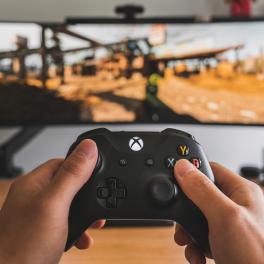
This article was developed with research assistance and initial contributions from Isobel Martin, a work experience participant of VoiceBox.

Life 360, a popular location-sharing app for families, has over 42 million downloads worldwide. This nod towards child surveillance is just one example of thousands of tools available to parents who (understandably) want to monitor their young person’s activity.
But does peace of mind come at a cost? In this youth review, young people give their perspective on internet-based parental supervision.
What Tools Are Out There?
There are many tools and apps for parents to track location and device activity. Here are some frequently mentioned by our young people.
- FamiSafe
- Life 360
- TeenSafe
- Qustodio
- NetNanny
These tools include features like location tracking, device activity monitoring (including being able to read text and social media messages), screen-time settings and content blocking.
How Much Is Too Much?
Device tracking has become a normal part of many family dynamics across the world. This is beneficial in many ways: it provides comfort to both parents and their young people who are experiencing lots of things for the first time.
“Tracking is used to be sure their children are safe” – VoiceBox interviewee
But constant monitoring can, in some cases, feel like an invasion of privacy. Over-16s, in particular, told us monitoring feels unnecessary and limits their freedom.
“I think it’s fair for younger kids to have some guidance and oversight on what they are doing online. The internet can be kind of a terrible place sometimes, but in some cases they push for those restrictions for way too long. Older teens especially need some independence and privacy” - VoiceBox interviewee
“I think what a lot parents struggle with as their kids get older is that they must adapt their parenting styles” – Reddit user
Trust and communication frequently appear as a touchpoint between parents and children. The young people we spoke to said parents can become ‘paranoid’ and ‘obsessed’ with monitoring – and struggle to stop as a result. Of course, reasonable monitoring can be constructive, particularly for tweens using their first social media accounts or VR platforms. But some young people feel excessive check-ups stop children from developing independence.
“It can become controlling and obsessive” – VoiceBox interviewee
“Doesn’t allow independence to develop” – VoiceBox interviewee
“Using a parental control app might make parents feel safer, but it can really mess with trust. If they’re spying on you, you’re not gonna want to talk to them about anything serious." - VoiceBox interviewee
Overreliance on location tracking apps can, according to our young people, encourage poor communication. Because parents (technically) no longer need to verbally ask where their child is or what they are doing, many young people collectively agree that it can hinder families from speaking to one another.
“It discourages open communication between the child and the parent” – VoiceBox interviewee
“My best friend in university had one of those tracking apps still installed on his phone by his parents. They originally installed it when he was in high school, but insisted he kept it on after he moved out for ‘safety reasons’, but his mom started abusing this system. She would constantly call him to check where he was going whenever she got an alert that he had gone outside the set location radius. And at one point she even called the campus police to do a wellness check on him because she could see he wasn’t at his dorm. He was completely fine; he had just spent the night at a friend's place and wasn’t answering his phone at 8 am. It was such an excessive amount of monitoring for a 19-year-old who had moved away to school, and it really impacted him.” – VoiceBox interviewee
Apps that monitor children’s online activities (such as TeenSafe and NetNanny) enable parents to, among other things, block, filter, and check activities and messages. Like location tracking, moderate surveillance of online activities can be helpful. Traditional social media and newer VR platforms both contain inappropriate content that children should not be exposed to, and online parental supervision can be used to mitigate risk. There are, however, wider problems related to excessive checking and monitoring.
Consent Not Required
Some of the apps we tested presented controversies and issues that we felt should be brought to the attention of decision-makers.
TeenSafe is a web application that monitors all activity on a smartphone. It gives parents access to location, geo-fencing, SMS, WhatsApp, Snapchat, Instagram, Facebook, Viber and associated media, browser history, call logs, photos and videos, notes and calendar entries. It also offers ‘Stealth Mode’, which monitors a phone without detection.
“TeenSafe is like a ghost which vanishes once it is installed” – TeenSafe
“Monitor an iPhone, without being detected” – TeenSafe
This causes concern for a few reasons. First, it takes away young people’s autonomy, removes any room for healthy discussion and completely disregards privacy. If ‘spying’ on an adult at such extreme capacity is considered unethical, why is it not the same for children? Second, installing TeenSafe gives it access to vast amounts of private data, often without the child’s consent. The UN Convention’s Rights Of The Child (1989) includes the right to privacy, family and home. But as the digital world takes on a new dimension, the lines are blurred between what is appropriate and what isn’t.
“No child shall be subjected to arbitrary or unlawful interference with his or her privacy, family, home or correspondence, nor to unlawful attacks on his or her honour and reputation.” – UN Convention
“So basically my parents are tracking every call, message, anything to everything on my phone using a website called Teensafe. How could I bypass it or convince them to stop using the website?” – Reddit user
In 2018, TeenSafe suffered a huge data leak that compromised thousands of user IDs and passwords. The data – which included children’s email addresses – were reportedly kept in plaintext, despite TeenSafe’s claims of encryption. It begs the question: how genuine are (some) parental control apps? Are they exploiting anxious parents for pricey monthly subscription fees? Do they care about children’s privacy?
The Importance of Play
Space to play is an increasing rarity for children across the globe. Just last month (August 2024), Leicester City Council announced the closure of its remaining ‘adventure playgrounds’ – popular with disadvantaged children who visit the sites to play and get a hot meal.
Sadly, this is just one instance of a growing trend in defunding children’s spaces, and the result is young people turning to their devices for downtime and entertainment. But when their ‘digital playgrounds’ are heavily monitored and restricted, it leaves little room for growth and independence.
The young people we spoke to said too much control ‘fuels annoyance’ and leads to ‘more rebellion’. Videos containing ‘hacks’ to bypass parental controls often circulate on social media – arguably putting children in a dangerous position and unable to communicate with their parents about online safety.
“My friend in high school kept a second phone that she used to text her friends and go on her secret Instagram account. Her parents had one of those monitoring apps and would bring up every little conversation she had on her phone until she couldn’t take it anymore. She got her friend who was a few grades above her to buy a used phone for her and we all communicated with her on that one instead. She wasn’t even doing anything bad she just wanted to talk to her friends about her recent breakup without her parents reading everything she was saying.” - VoiceBox interviewee
“My friend is 16 and he is only allowed on the computer to play games for 1 hour a week. He is only allowed his phone for 2 hours a week. This built distrust between him and his parents and you can tell. Every time I talk to him, he talks about how much he hates his parents for all the parental control sh*t. Of course, I don't think he actually hates his parents, but he really struggles with his home life” – Reddit user
“They don't know I have any socials. How do I go about getting a 2nd phone without them finding out? I'm just sick of the overprotection.” – Reddit user
Long-Term Impact?
The normalisation of constant tracking and monitoring during childhood and adolescence may have unintended consequences as young people grow into adults. We are concerned that this level of parental surveillance is teaching a generation of young people that tracking is normal. It’s become so commonplace that it poses a wider risk as teens grow into adults: how will they differentiate between healthy and controlling relationships when surveillance is all they’ve ever known?
While many parents implement tracking tools with good intentions (after all, there are plenty of online risks to try and shield children from), it's worth considering how this level of monitoring might shape a child's understanding of privacy and autonomy.
“My 3 roommates and I all got the Life360 app our freshman year of university so we could make sure each other was safe. At first, it was nice to have peace of mind knowing we all knew where each other was, but after one of my roommates started showing up wherever I was on campus to come talk to me when all I really needed was some time away, I started to feel like I was being stalked. I didn’t know how to tell her though because it's so normal for friends to share their locations with each other now and I didn’t want to cause a fight.” - VoiceBox interviewee
Too Many Tools
There is, however, another side to the argument. We know that it’s not easy being a parent in the digital age, and social media platforms don’t exactly make parental supervision tools straightforward.
A report from our sister organisation, Parent Zone, found that, on average, social media platforms contain 15 different tools that take over an hour to set up. For busy parents (some of whom lack confidence in media literacy), expecting them to navigate such complexities is a big ask. For many, it makes more sense to install a singular app like TeenSafe or NetNanny.
Young people also told us that some parents prefer physically checking devices in regular check-ups rather than relying on monitoring and tracking apps. They said this improves trust between child and parent.
“Having checkups makes them trust me more” – VoiceBox Interviewee
There is no uniform approach to internet-based parental supervision. Far too many factors are at play: individual dynamics, socioeconomic status, levels of support needed and access to tech, to name a few. But while there’s no straight answer, there are things that can be done to make life easier for families.
Potential Remedies
First, we see potential in clearer industry guidelines for tech firms to follow. Part of the problem is that there are simply too many tools for families to utilise – they take hours to set up and they vary from platform to platform. Having a set of guidelines in place should, in part at least, remove complications.
Second, parents (when they can), might find it beneficial to maintain an open dialogue with their child instead of placing blanket bans on devices and apps. Of course, every child is different, and some might need additional tools in place. But when the emphasis is placed on children doing ‘bad’ things with their devices, it takes away from the exciting opportunities available to young people online.
Third, there needs to be greater media literacy education available in community spaces. While we welcome its integration into school curriculums, parents, and other adults, deserve similar support. Libraries, in particular, are an untapped resource that could serve as ‘hubs’ for adults to develop their media literacy skills.
Support Young Creators Like This One!
VoiceBox is a platform built to help young creators thrive. We believe that sharing thoughtful, high-quality content deserves pay even if your audience isn’t 100,000 strong.
But here's the thing: while you enjoy free content, our young contributors from all over the world are fairly compensated for their work. To keep this up, we need your help.
Will you join our community of supporters?
Your donation, no matter the size, makes a real difference. It allows us to:
- Compensate young creators for their work
- Maintain a safe, ad-free environment
- Continue providing high-quality, free content, including research reports and insights into youth issues
- Highlight youth voices and unique perspectives from cultures around the world
Your generosity fuels our mission! By supporting VoiceBox, you are directly supporting young people and showing that you value what they have to say.





